Teeth whitening is no longer the exclusive domain of Hollywood movie stars and Premier League football players.
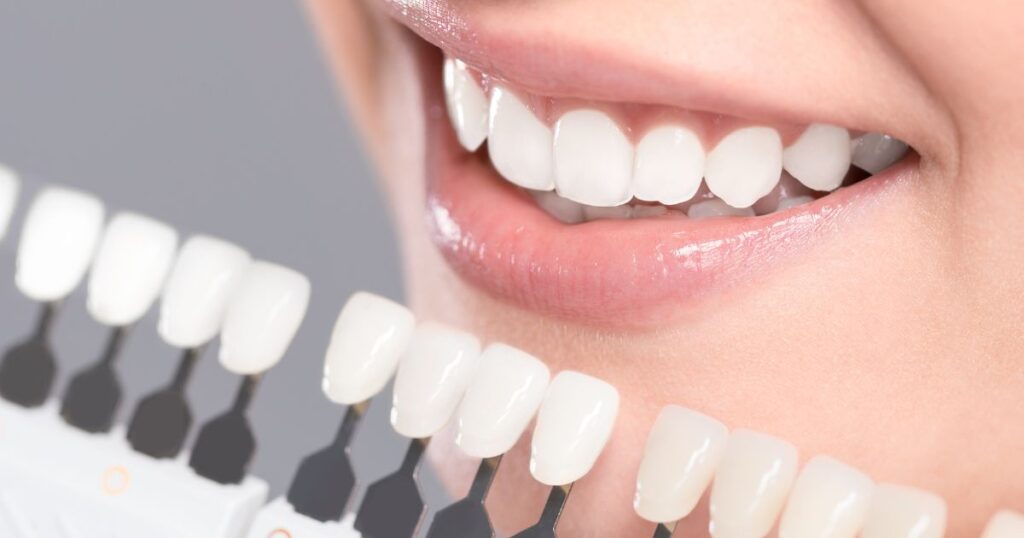
More and more people in the UAE are finding that the best clinics offer effective and affordable procedures that can brighten their precious smiles.
Teeth whitening goes beyond mere aesthetics; it’s a revitalization of your smile and can be a game-changer for your confidence as well as your oral health.
Like a fine white shirt that may be clean and well looked after but after a few years, the inevitable yellowing starts to look unsightly; with teeth, natural wear and tear over the years can stain teeth and dim the gleaming whiteness you were born with.
But, like the whiteness in a professionally cleaned shirt, the whiteness of teeth can be restored. If you’re based in Abu Dhabi, the good news is that some of the best teeth whitening clinics in the UAE are here.
Let’s take a closer look at what the process entails and address some frequently asked questions about the procedure so that you know what to expect from a visit to a teeth whitening specialist in Abu Dhabi…
- What is teeth whitening?
- Who performs teeth whitening in the UAE?
- What happens during teeth whitening sessions with dentists?
- Is teeth whitening effective for everyone?
- Can yellow teeth become sparkling white again?
- Is teeth whitening permanent?
- What happens if you leave yellow stains on your teeth?
- How much does it cost to whiten teeth in UAE?
- Other ways to look after your teeth in Abu Dhabi
What is teeth whitening?
It is a cosmetic procedure with the primary goal of lightening the color of the teeth.
Almost everyone’s teeth develop some staining over time. Everyone knows that twice-daily brushing helps keep teeth clean. Those who consume coffee, certain alcoholic beverages, tobacco and other highly pigmented products notorious for staining teeth may benefit from regular teeth cleaning procedures to remove stains, plaque and tartar. This improves the condition of the teeth but will not make them much whiter in appearance.
That’s where teeth whitening comes in. Your dental hygienist can employ techniques to lighten the color of your teeth. This usually involves bleaching agents containing a peroxide, such as carbamide peroxide and/or hydrogen peroxide, which permeate dental hard tissues.
Application of these substances for extended periods changes the natural color of teeth and will lift and eliminate both deep (intrinsic) and surface (extrinsic) stains, lightening the teeth’s existing color by several shades.
There are also over-the-counter, non-bleaching whitening products available, containing substances that help to remove extrinsic stains only.
Many people feel a sense of increased self-confidence from brighter teeth and a more radiant smile that results from the procedure – especially anyone who has suffered yellowing teeth, enduring stains and discolorations in previous years.
Is teeth whitening safe?
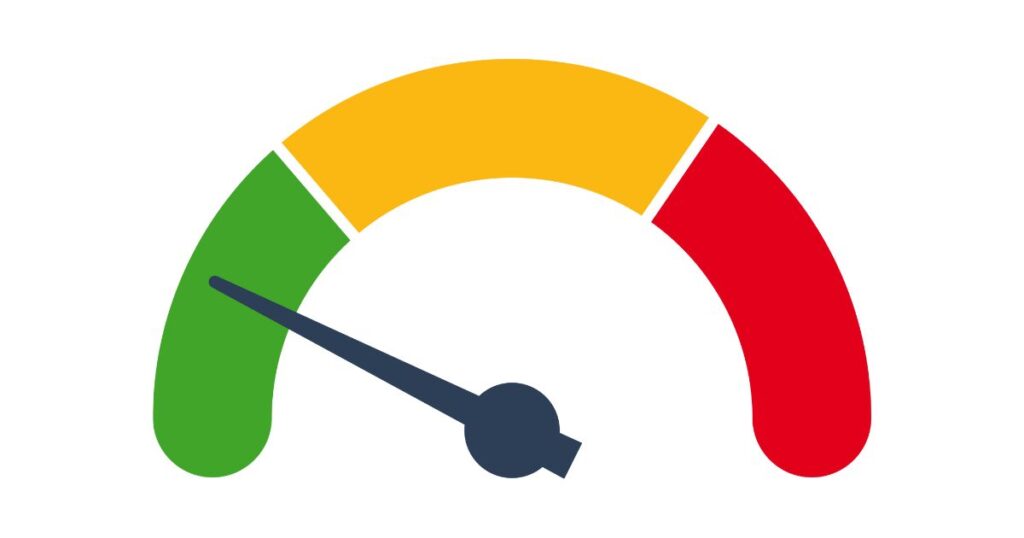
Yes, if executed by a licensed professional is safe and poses very few risks. The main risks come from home whitening kits that are not tailor-made or administered by a professional.
Any teeth whitening process can lead to temporary tooth sensitivity and gingival inflammation but it is generally considered safe and effective for most people when performed by a professional. (source)
Teeth whitening is not recommended for people with:
- Overly sensitive teeth
- Gum disease (periodontitis or oral cancer)
- Worn tooth enamel
- Active tooth decay
- Pregnant women
Who performs teeth whitening in the UAE?
Only a certified dentist or another trained professional, like a dental hygienist or dental therapist, should carry out professional teeth whitening, as it is a specialized form of dentistry.
This applies wherever in the world you have the procedure performed. At ICDE, the dental hygienist is the one who will perform the teeth whitening procedure.
Be wary of teeth whitening in a beauty salon as the procedure may be conducted by an unlicensed professional, which can expose you to oral health risks.
What are the risks of whitening your own teeth?
Home kits for teeth whitening are available over the counter in Abu Dhabi and the rest of the UAE – with tooth whitening strips, toothpaste, gels and films that promise the smile you always wanted.
Beware, though! These products may not be very effective and could expose you to the same risks as a beauty salon treatment with an untrained therapist. Seek advice from a dentist or a dental hygienist before using a home kit and understand all your options and the associated risks.
Many home kits don’t contain enough whitening agent to be effective so the results may disappoint you. Other kits are too abrasive and may damage your teeth, especially the tooth enamel.
Besides this, the whitening tray provided, which is an essential part of the teeth whitening equipment, may not fit properly, causing some of the bleaching gel to leak out onto your gums. This can cause blistering and sensitivity in the mouth.
For more information about the safety and effectiveness of teeth whitening, refer to this study, which concludes:
“Current research about tooth whitening shows that it is safe and effective when manufacturer’s protocol is followed, yet there are risks of which the profession and users should be aware.”
What happens during teeth whitening sessions?
When performed in a dental office, teeth whitening is a convenient, one-visit procedure. During an in-office session, a higher concentration of peroxide is used in the bleaching agents under the supervision of a dental professional, which allows for significant whitening in a single appointment. For those opting for at-home whitening systems, the process is different. In order to build a custom-fitted tray, you must first go to the dentist to have an imprint of your teeth taken.
This personalized tray is then used in conjunction with a dentist-recommended bleaching gel. Your dentist will provide you with detailed instructions on how to apply the gel at home.
The distinction between home whitening and in-office whitening is crucial. At-home treatments involve a lower concentration of peroxide in the bleaching agent and require a longer duration to achieve the
Laser teeth whitening
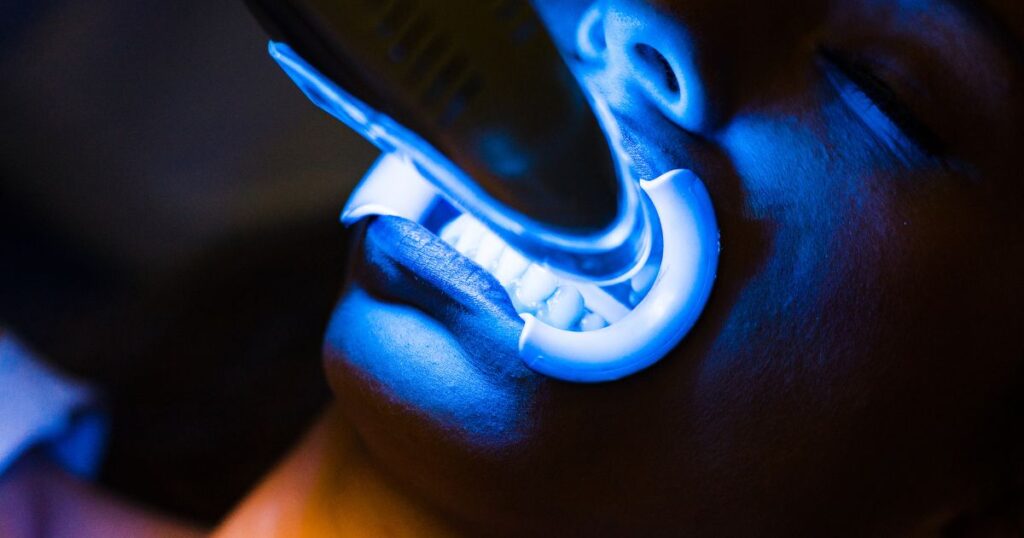
Laser whitening or “power whitening” is another type of system that a dentist can use to whiten teeth. You paint a bleaching product onto the teeth and then shine an LED light to activate the whitening, a process that can be much faster than the tray/bleaching system.
Speak to your dental professional for advice on the most suitable system for your teeth.
Extrinsic vs intrinsic stains
If a tooth changes color or translucency, it is said to be “discolored”. These discolorations are usually classified as extrinsic or intrinsic.
Extrinsic stains typically come from colored compounds on the enamel. They often stem from lifestyle habits. These include drinking coffee, smoking tobacco, or consuming pigmented foods and beverages. These stains are often exacerbated by poor oral hygiene.
Intrinsic stains occur inside the tooth, within the enamel or the underlying dentin. These usually result from genetic disorders or local factors during tooth development. Aging can make enamel more translucent and thinner. This lets the yellower dentin show through. It darkens the overall color of the tooth.
Intrinsic stains are tougher to remove. Some over-the-counter products may be effective at lifting extrinsic stains but they rarely have much impact on intrinsic staining.
Is teeth whitening effective for everyone?
It’s wrong to say that everyone should whiten their teeth. Medically, teeth whitening isn’t necessary. Most people opt for it for cosmetic benefits, not oral health. However, the whitening process also naturally cleans the teeth.
Your dentist will advise if it’s right for you. If you have gum disease, decay, oral cancer, crowns or a pressing dental issue, teeth whitening is unlikely to be the right option for you. Also, bear in mind that it doesn’t work on dentures, fillings or veneers.
Before committing to whitening, ask your dentist about the types of whitening treatments available, the results you can expect and how long the improved appearance is likely to last. You can also check what risks there are (if any) and ask for an estimate of the costs of teeth whitening.
Can yellow teeth become sparkling white again?
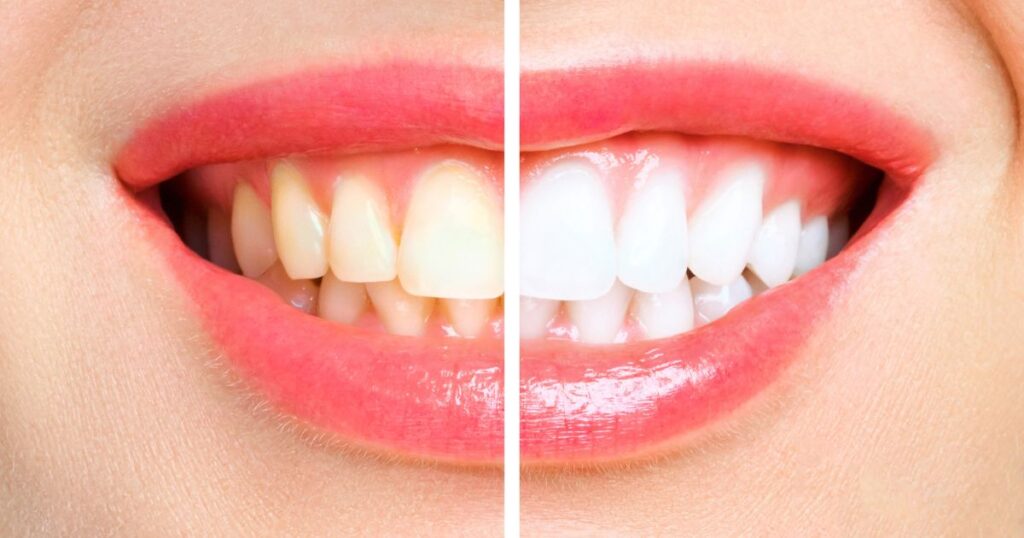
Yellow teeth won’t become brilliant white, despite what the advertisements say and what whitening products may claim. Speak to your dentist for realistic expectations of the results you can attain with a professional whitening procedure.
You can reasonably expect to lighten your teeth’s existing color by several shades. However, keep in mind that this applies only to natural teeth, not to tooth-colored restorations.
Be mindful of whitening risks like sensitivity, mouth irritation, and potential gum burns.
Is teeth whitening permanent?
Teeth whitening is not permanent. Much depends on your teeth, the quality of the procedure undertaken and your lifestyle but the whitening effect generally lasts anywhere from a few months up to two years or more.
For heavy smokers and drinkers of red wine, tea and coffee, the whitening effect may not last more than a few months but this does vary from person to person.
How often should you whiten your teeth?
Many people who whiten their teeth return after seeing the positive results first-hand.
This might be after a few months or a year or two if the whiteness starts to discolor again but it depends on your teeth, your lifestyle and cleaning habits, as well as the method of whitening used.
What happens if you leave yellow stains on your teeth?
Unsightly yellow staining can accumulate on the teeth from pigments in certain foods and beverages. Regular brushing and deeper cleaning can help you maintain good oral health but some people gradually lose confidence in their smile and overall appearance as their teeth become noticeably yellower over the years.
Yellowing can be exacerbated by aging, certain medications (such as diuretics and beta-blockers) and trauma to a tooth. Brushing, regular cleaning and frequent visits to a dentist will maintain health and prevent serious oral issues from developing but will do little to combat this type of yellowing. Only professional teeth whitening using a bleaching agent can tackle such discoloration.
Leaving visible stains and discoloration on your teeth will not only damage confidence, self-esteem and well-being; it can also lead to oral health issues, such as:
- Enamel erosion: Persistent stains can sometimes lead to the weakening of the enamel, making teeth more susceptible to cavities and decay.
- Gum sensitivity: Discolored teeth can sometimes be a sign of underlying gum issues, which, if not addressed, can lead to gum disease.
- Greater potential for neglecting dental care: Neglecting overall dental health can lead to more severe problems like cavities, gum disease and even tooth loss.
Choosing teeth whitening shows you care for your oral health and value your smile. It also gives you another chance for a dental check-up. This can lead to earlier problem detection than for those who rarely visit the dentist.
How much does it cost to whiten teeth in UAE?
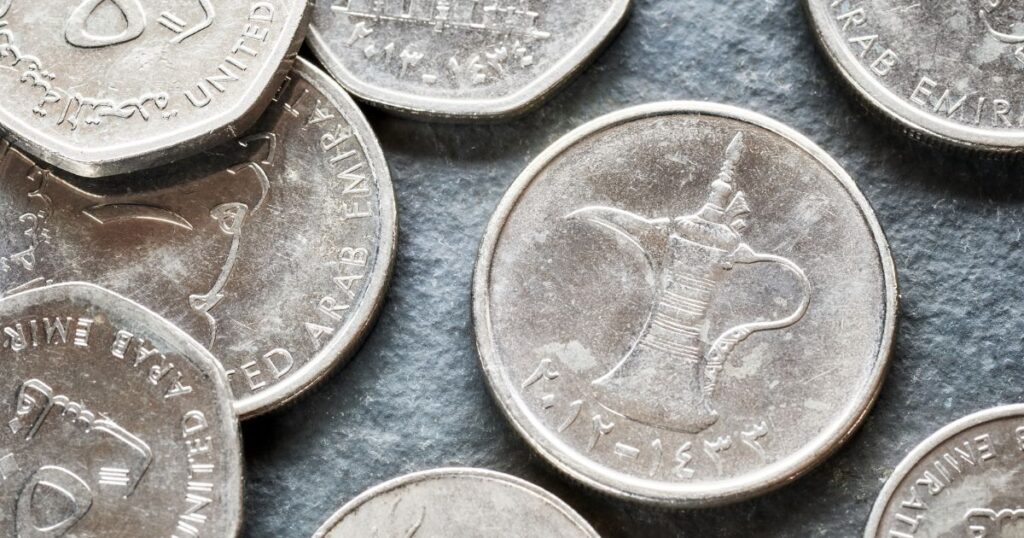
The price in UAE varies according to the dental office, and the procedure chosen.
Our dentists in Abu Dhabi usually starts at AED 1200 and goes up to AED 2400.
Because teeth whitening is considered a cosmetic procedure, it is generally not covered by health insurance policies that include dentistry.
Other ways to look after your teeth in Abu Dhabi
Teeth whitening is one way to improve the appearance of your teeth but white teeth don’t necessarily mean perfectly healthy teeth and gums.
It’s important to brush and floss daily. You should also schedule regular teeth cleaning – twice per year is recommended.
If deeper cleaning is required and the beginnings of gum disease are present, you may be recommended scaling and root planing by your dentist. Deep cleaning of the teeth and gums can help prevent gingivitis and excessive tartar accumulation from worsening. This can prevent full-blown gum disease (periodontitis).
A periodontist usually performs scaling and root planing using specialized tools like ultrasonic scalers to ensure a thorough cleaning.
Other common dental procedures in Abu Dhabi that can look after the long-term health of your teeth are:
- Strengthening with fluoride treatment, to protect against bacteria and prevent cavities.
- Protective fissure sealants on the chewing surfaces of molars and premolars, which provide a protective barrier against bacteria.
Teeth whitening in Abu Dhabi
Holistic dental care requires regular dental visits – not only for the cosmetic benefits but for long-term oral health.
Teeth whitening rapidly improves your teeth’s appearance and suits most people, though not everyone. Consult a dental professional to determine if it’s the right choice for you. It has become one of the most sought-after dental procedures in the UAE. Consult with the skilled dentists at Abu Dhabi’s International Center for Dental Excellence (ICDE) for whitening advice or other oral health care concerns.
To find more similar content you can visit our other blogs HERE.
